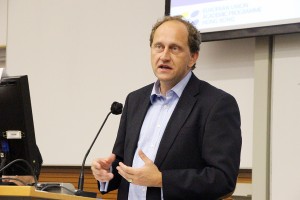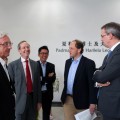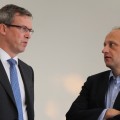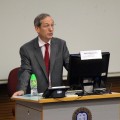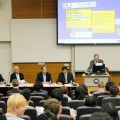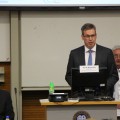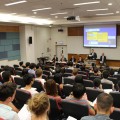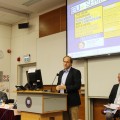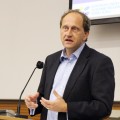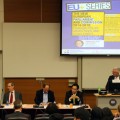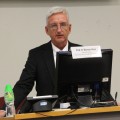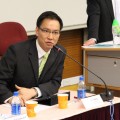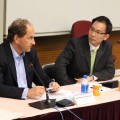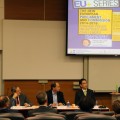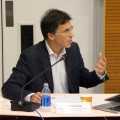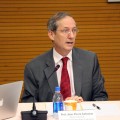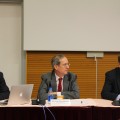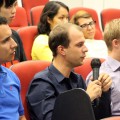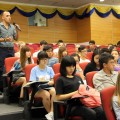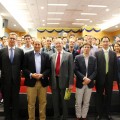Date/Time
Date(s): 08/10/2014
Time: 5:30 pm - 7:30 pm
Location
WLB104, 1/F, Wing Lung Bank Building Shaw Campus
Language: English
Admission: Registration by e-mail
Roundtable Discussion with Vice-President of the European Parliament: “The New European Parliament and Commission 2014-2019: Foreign Policy Objectives and Challenges”
Mr. Lambsdorff was elected into the European Parliament elections in 2004 and was re-elected in 2009 and 2014. In the European Parliament he worked towards the creation of a single EU market for defense and security-related equipment. He is a strong supporter of the European stability pact but also of the principle of subsidiarity, which in effect would prevent the emergence of an ”European super-state” dominated by the EU Commission.
Discussants:
– Mr. Alexander Count Lambsdorff, Vice-President of the European Parliament
– Prof. Jean-Pierre Cabestan, Head of Department of Government and International Studies, HKBU & Director General of the EUAP
– Dr. Stefan Auer, Associate Professor (European Studies) at the University of Hong Kong and Jean Monnet Chair in EU Interdisciplinary Studies at La Trobe University Melbourne
– Dr. Martin Chung, Research Assistant Professor, EUAP
Moderator:
Prof. H. Werner Hess, Associate Head of Dept. of Government and International Studies, HKBU & Deputy Director of the EUAP
Event summary:
On 8th October 2014 the EUAP was honored to host Mr. Alexander Count Lambsdorff, Vice-President of the European Parliament, who joined the roundtable discussion ‘The New European Parliament and Commission 2014-2019: Foreign Policy Objectives and Challenges’. The discussants comprise Prof. Jean-Pierre Cabestan, Head of Department of Government and International Studies of Hong Kong Baptist University & Director General of the EUAP, Dr. Stefan Auer, Associate Professor (European Studies) at the University of Hong Kong & Jean Monnet Chair in EU Interdisciplinary Studies at La Trobe University Melbourne, Dr. Martin Chung, Research Assistant Professor of the EUAP. Prof. H. Werner Hess, Associate Head of Dept. of Government and International Studies of Hong Kong Baptist University & Deputy Director of the EUAP was the moderator of the discussion.
Count Lambsdorff explained to the audience the responsibilities of the European Commission and the European Parliament regarding foreign policy. He described the EU neighborhood as crisis-prone and provided examples of backsliding democratic transitions in Egypt and Libya, as well as destabilizing actions of Russia in Ukraine. Moreover, among policy challenges he mentioned the accession negotiations with Western Balkans countries and Turkey. The discussants shared their opinions on Transatlantic Trade and Investment Partnership as the most important economic objective in external relations. Count Lambsdorff emphasized the unity between EU member states as a foundation for strong and effective Common Foreign and Security Policy. Accordingly, a European Union marked by divisions risks losing credibility and influence.
Dr. Auer pointed to the weaknesses of EU reliance on soft power and the concurrent lack of military capability. Count Lambsdorff agreed that soft and hard powers are inseparable. He acknowledged that the EU’s soft power has limitations and is not sufficient to face current security threats. In response to concerns of Prof. Cabestan over the prospects of making the EU more coherent, he mentioned the reduction of the number of EU Commissioners as one possible solution towards increased efficiency of policy making processes.
Debating the unstable situation in Eastern Europe, Dr. Auer stressed that the EU inadequately focused on stability of the region in the past and remains ill-prepared to respond to Russia. According to Count Lambsdorff, cooperation between the EU, which favors the status quo, and Russia as a revisionist power is highly difficult to achieve. The EU should not push forward with its involvement in countries entangled in unresolved territorial disputes such as Ukraine, Moldova or Georgia. Moreover, EU reliance on gas supplies give Russia strong bargaining power and encourages the EU to move towards closer cooperation in energy sector.
On the topic of the Islamic State, Count Lambsdorff argued that the problem should be addressed through military action and political cooperation with the Iraqi government. Moreover, various security institutions such as Europol and intelligence agencies have to strengthen their efforts to track, control and if necessary arrest Islamic extremists returning to Europe. Addressing recent discussions over revoking citizenship, he added that the right to come back to one’s country cannot be denied.
Dr.Chung guided the discussion toward the topic of EU diplomacy in the Asia-Pacific region and the importance of EU partnership with China. Count Lambsdorff stressed that the EU maintains close cooperation with Asian countries, however, focusing on the economy rather than security. Regarding relations between the EU and China, he stated that the EU may encourage China to reconsider its policies. However, the EU is unlikely to interfere in issues related to Chinese territorial integrity.
Count Lambsdorff also commented on recent political events in Hong Kong, saying that the peaceful way of conducting demonstrations has gained a great degree of sympathy within the EU. Moreover, he argued that the demonstrators are not fighting to change the political system in China but to justly remind Beijing of the promise of democratization made previously and of the preservation of freedoms guaranteed by the Basic Law of Hong Kong.
活動摘要:
香港歐洲聯盟學術計劃(EUAP)於10月8日舉辦以「2014 – 2019 年度新一屆歐洲議會及歐盟委員會:外交政策的新方向與難題」為題的圓桌討論,幸得現任歐洲議會副主席Alexander Count Lambsdorff 先生(下稱Lambsdorff先生)蒞臨參與討論,讓參加者親身接觸歐洲政治代表,得到寶貴的第一手資訊。是次圓桌討論由香港歐洲聯盟學術計劃副總監暨浸大政治及國際關係學學系教授Hans Werner Hess教授主持,與會者包括香港歐洲聯盟學術計劃總監暨浸大政治及國際關係學系系主任高敬文教授、香港歐洲聯盟學術計劃研究助理教授鍾子祺博士和香港大學歐洲研究學系副教授Stefan Auer博士。
在圓桌討論前的演說中,Lambsdorff先生提及到,歐洲議會和歐盟委員會擔當的角色明顯有別,但處理外交問題的方針大體相同。其中,鄰國的民主進程是歐盟成員國之間的重要外交議題,例如埃及、利比亞等地有所倒退的民主發展,以及俄羅斯介入烏克蘭的潛在危機等。此外,歐盟創立初期建基於經濟發展,及後漸漸發展為政治機關。時至今日,歐盟仍然採用類似的方法。其中一個例子為以巴爾幹地區西部成員國與土耳其達成的經濟協商,作為與鄰國外交的主要途徑。當中,有參加者分享對「跨大西洋貿易與投資伙伴協定」(TTIP,Transatlantic Trade and Investment Partnership)的意見,認為該計劃為現時外交事務當中最重要的經濟方案。Lambsdorff先生回應,指歐盟成員國之間的關係,長久以來一直建基於有效率的共同外交及防衛政策。因此,歐盟成員國若有分歧,則難以維繫現有的對外影響力及可信性。
Stefan Auer博士質疑,面對外界的軍事壓力,例如極端組織「伊斯蘭國」武裝份子、烏克蘭危機等,若歐盟單靠故有的「軟實力外交」,成效並不顯著。身為歐洲議會副主席,Lambsdorff先生認同Stefan Auer博士的觀點,直言歐盟的軟實力具有限制,未必可以有效面對任何國家所帶來的威脅。高敬文教授亦指出,現時歐盟各國決策欠缺統一性,成員國之間的立場不一,在處理問題的時候,情況更加繁複。Lambsdorff先生相信,新一屆歐洲委員會減少委員數量,有望幫助提升決策效率,減少程序。
對於東歐的不穩定局勢,Stefan Auer博士指,歐盟過往過份集中維繫成員國之間的良好關係,忽略了防備俄羅斯的潛在危機。Lambsdorf先生相信,歐盟傾向維持現時的外交方針。而且,以共產主義為重心的俄羅斯與歐盟政治理念分歧太大,難以發展明顯的外交關係。另一方面,俄羅斯意欲擴張,造成對烏克蘭、格魯吉亞和摩爾多瓦等國的邊界問題,現處於膠著狀態,前景模糊。故Lambsdorff先生認為,歐盟不應過份主動參與其中。另一方面,俄羅斯為現時歐盟成員國的主要天然氣來源,透過出口能源,俄羅斯能夠獲取龐大利潤。Lambsdorff先生相信,可以用能源貿易作為交涉條件,制衡俄羅斯的擴展活動。換言之,歐盟應該繼續運用故有的經濟方式去處理國際關係。
近日,伊斯蘭國的影響力有增無減,Lambsdorff先生相信歐盟須與伊拉克政府進行軍事和政治合作。而各個防衛組織,如歐洲刑警(Europol,European Police Office),須採取行動,例如加強追蹤和管制,避免伊斯蘭恐怖份子進入歐盟境內;必要時,須拘捕有關人士。對於不少輿論憂慮身為伊斯蘭國成員的歐盟公民可以在28個成員國之間自由出入,並提出撒消有關人士的公民身份,Lambsdorff先生回應指歐盟必須賦予公民基本的權利,讓他們自行選擇甚麼時候回到自己的國家。
活動後段,鍾子祺博士將討論議題帶到亞洲,講述歐盟在亞太地區的外交政策,以及作為中國主要合作伙伴的重要性。Lambsdorff先生強調,歐盟希望往後可以維持與亞洲各國的合作。不過,合作的重點將會側重於經濟多於國防。另外,他認為歐盟可以帶動中國的政策發展,但歐盟不會干預中國事務,包括邊界及民族融和問題。
圓桌討論結束之前, Lambsdorff先生就近日香港的「公民抗命運動」作出回應。他認為示威者並非要挑戰中國政府及整個結構,而是希望北京兌現最初的承諾,給予香港民主,以及保障社會上各種自由,維護基本法的實際行使權力。他又指出,市民一直以和平方式示威,令外界大為欣賞。他亦表示歐盟對是次佔領運動有所關注。
Photo album: (click to zoom and view caption)
ENQUIRIES
euaphk@hkbu.edu.hk



